On May 25, 1939, the Navy cruiser U.S.S. Nashville docked at Rio de Janeiro, Brazil, and Acting Chief of Staff Brig. Gen. George Marshall began his first trip on the world stage.
The planning for the trip was detailed, and included ordering the white uniforms worn in the tropics. While at March Air Base, CA, Gen Marshall got a radiogram from Col. Harold Bull: “Have ordered your white uniform to try on [May] fifth.” The uniform list was long and besides the tropical white uniform included mess dress, dress blue uniform with cape and medals, and khaki summer service uniform.
The visit was official, but friendly. Gen. Marshall wanted to assess the readiness of the Brazilian military, and to test the possibility of port facilities being made available to U.S. vessels in case of war, for hemispheric security. He also wanted to create a relationship with the Brazilian military, as Germany had been issuing invitations to the Brazilians. In a May 30 communique from the British Embassy in Washington, D.C., it was noted that “not long ago General Monteiro was invited to visit Germany as a special guest. He refused this invitation.”
In a May 6 memorandum from U.S. Ambassador to Brazil Jefferson Caffery with an outline of Gen. Marshall’s schedule, he wrote that “formalities are being kept to a minimum and the time will be spent mainly in visiting establishments of a military character.”
Gen. Marshall and his party departed from New York City, and while sailing south, he was “summoned” to an equator-crossing ceremony featuring King Neptune, a U.S. Navy tradition for any traveler crossing the equator for the first time. The Acting Chief of Staff was not immune to the hijinks.
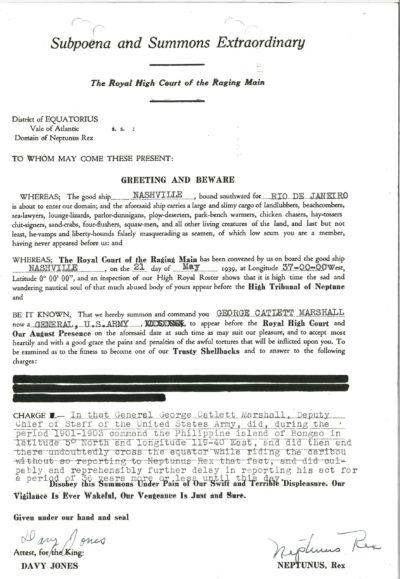
“Summons” from Neptunus Rex and Davy Jones for the equator-crossing ceremony
According to a New York Times article from May 26, upon disembarking the Nashville, he was greeted at the port in Rio de Janeiro by “a representative of President Getulio Vargas, by United States Ambassador Jefferson Caffery, General de Goes Monteiro and his staff, other high military and naval officers and Mayor Henrique Dodsworth of Rio de Janeiro.”
In his welcoming comments, the Times quoted Gen. Marshall saying, “Your invitation to visit you is accepted with appreciation of the profound sentiment of that friendship that urged it.”
The visit was wildly popular with the Brazilian people. They turned out in thousands to see the U.S. General.
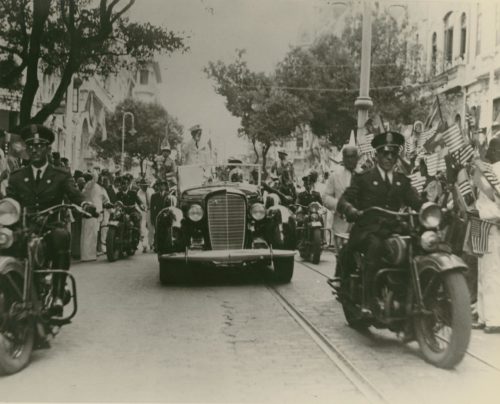
The official party, driving through Rio de Janeiro
The photo below shows the size of the crowd. Those in the welcoming party remarked on the spontaneous applause of the crowd as the automobiles passed.
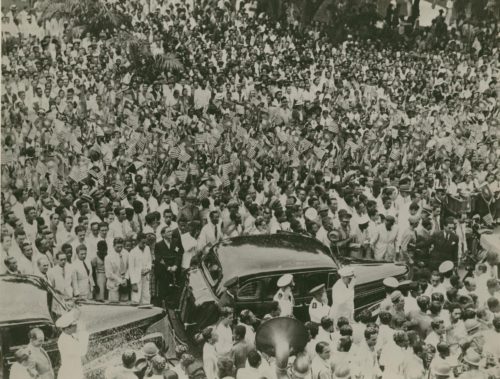
Thousands gathered to see Gen. Marshall
Gen. Marshall’s schedule gave him five days in the Rio de Janeiro area; one in the Minas Gerais area; and five days in southern Brazil – seeing eight of Brazil’s states during his visit. His first day schedule included seeing a coast artillery center; Fortaleza de São João da Barra do Rio de Janeiro; a military school; and poison gas, gas mask, and projectile factories. During his stay, there were a few receptions and dinners, too.
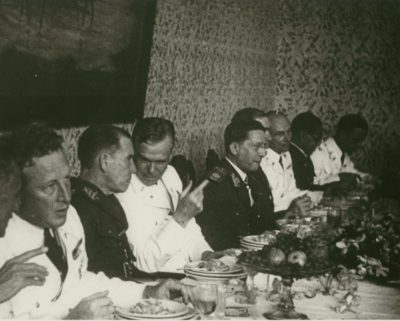
At a formal dinner in Rio de Janeiro
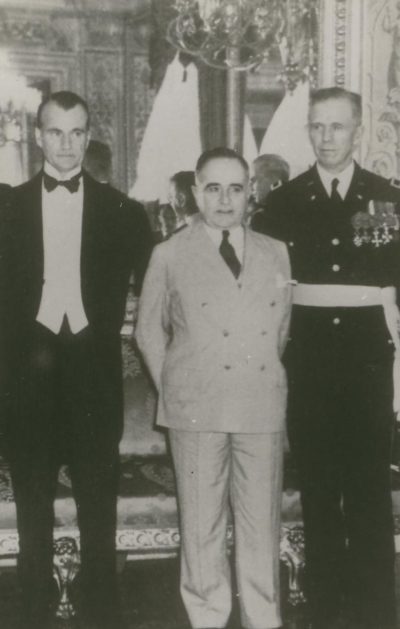
U.S. Ambassador to Brazil Jefferson Caffery, Brazilian Minister of War Gen. Eurico Gaspar Dutra, and Gen. Marshall, wearing his medals (which he didn’t do often).
On leaving Brazil, a U. S. military attaché reported that Gen. Marshall “left Rio de Janeiro this morning tired but extremely happy after a very busy program filling 13 days and calling for wearying travel over a half dozen states. He was most pleased with the cordiality of the reception accorded him everywhere he went.”
Gen. Marshall’s party did not return on the Nashville alone; Brazilian Army Chief of Staff Gen. de Goes Monteiro and an official party accompanied them. Once arrived in New York, Gen. de Goes Monteiro was greeted to a “rather nasty write-up in the Time [sic] directed against his appearance” which the paper did not think very military, reported Gen. Marshall to Ambassador Caffery. He wrote “while we did not get the public reaction of the people in the street and the children, such as developed in Brazil, yet he was given a really remarkable reception.” Gen. Marshall did not “think any other individual has ever had quite the view of America in a short time that this man did.”
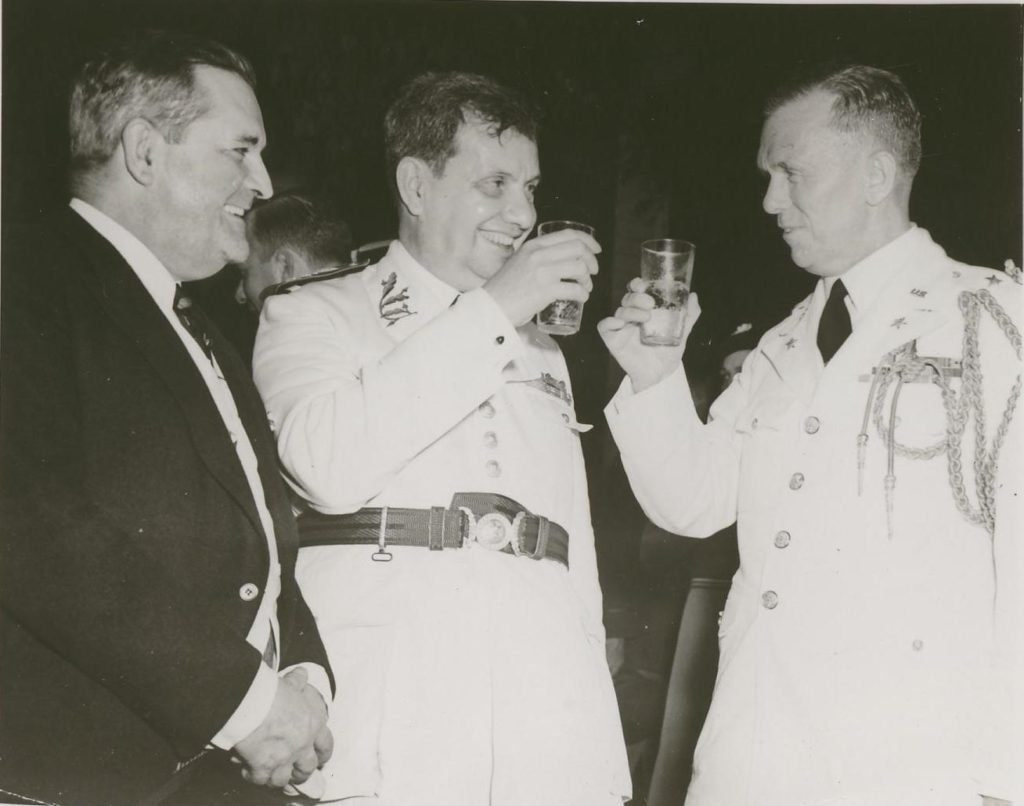
Brazilian Ambassador Carlos Martins Pereira E Souza, Brazilian Army Chief of Staff Aurelio de Goes Monteiro and Gen. Marshall at Fort Meade, MD.
After his return to the United States, Gen. Marshall wrote to Gen. Dutra, the Brazilian Minister of War, thanking him for the parting gift of a silver tea service. “I will treasure it as an evidence of boundless hospitality, and as a reminder of a great and friendly people among whom I passed two very happy weeks.”
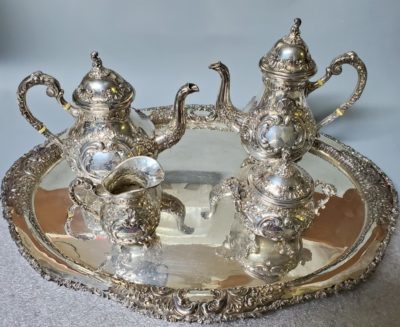
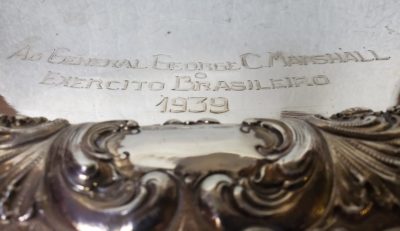
Tea service engraved “To General George C. Marshall from Brazilian Army 1939.”
Information for this blog is from the George C. Marshall Foundation collections, and the Web sites www.sas-space.sas.ac.uk, and http://w02.isaram.da.ulcc.ac.uk.
Melissa has been at GCMF since last fall, and previously was an academic librarian specializing in history. She and her husband, John, have three grown children, and live in Rockbridge County with three large rescue dogs. Keep up with her @life_melissas.
